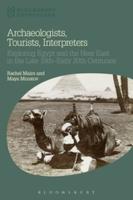
Bloomsbury (2015) p/b 147pp £24.95 (ISBN 9781472588807)
In the late nineteenth century an increasing number of people from Europe and U.S.A were travelling to Egypt and the Near East for a variety of reasons. There were scholars, archaeologists, travellers and package tourists, but very few of them could speak the languages or were familiar with the local customs. So they needed a dragoman, an interpreter and guide to be with them. This is the main subject of this book. It starts with general comments about the nature of their work, looks at the experiences of some well-known travellers, and finally, in great detail, talks about two dragomans in particular.
As is the case in all walks of life there are good and bad people. Dragomans are no exception. W.M. Thackeray in 1864 says: ‘our guide, an accomplished swindler’ while in Baedeker’s guide to Egypt (1876) he states: ‘There are about 90 dragomen [sic] in Cairo … but scarcely a half of the number are trustworthy’. On the other hand, many dragomans were indispensable to their employers, acting as tactful diplomats in dealing with local people, bodyguards, messengers, spies and even pimps. They sometimes had to scheme and improvise to enable their employers to fulfil their intentions. Quite often they were abused, discriminated against and treated with contempt by people who were very hard to satisfy. And yet, in many books written by travellers, the dragomans are denied any credit or barely even mentioned
Several well-known people are written about in some detail; Flinders Petrie, T.E. Lawrence, Sir Leonard Wooley and Sir Max Mallowan (all fluent speakers of local languages), while Agatha Christie (Mrs Mallowan) could manage only simple, domestic instructions.
The last two chapters home in on two notable dragomans. The first, Daniel Z. Noorian, worked for several American expeditions to ‘Babylonia’. He became a trusted friend of his employers and finally was helped to settle in America where he became an antiques dealer. The second, Solomon Negima, put together an amazing book of 65 testimonials giving a rare opportunity to access a dragoman’s own perspective.
As M. and M. say ‘This book is first and foremost about attitudes towards communication’. It reflects the present day belief that everyone should be recognised and acknowledged, however humble their role.
Olive Hogg
